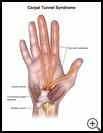
Carpal Tunnel Syndrome: Brief Version
________________________________________________________________________
KEY POINTS
- Carpal tunnel syndrome is a painful problem of the wrist, hand, and fingers.
- You may need to rest your hands more, wear a wrist splint, or do wrist exercises. Your provider may give you medicine. You may need surgery.
________________________________________________________________________
What is carpal tunnel syndrome?
Carpal tunnel syndrome is a painful problem of the wrist, hand, and fingers. It is very common.
What is the cause?
The pain is caused by pressure on a nerve inside your wrist.
People who use their hands and wrists in the same way a lot of the time can get this problem. For example, carpenters and typists often have this problem.
Carpal tunnel syndrome can also be caused by a wrist injury or problems like diabetes or arthritis. Some women have it during pregnancy.
What are the symptoms?
Symptoms may include:
- Pain in your hand or wrist. It may hurt the most when you use your hand. You may have more pain at night.
- Numbness or tingling in your hands and wrists
- Weak thumb
- Hands that are more sensitive to cold
- Dropping things more often
How is it treated?
Your healthcare provider may tell you to:
- Rest your hands more often.
- Change the way you use your hands.
- Wear a wrist splint.
- Do wrist exercises.
Your provider may also give you medicine to help the swelling and pain. Sometimes you may need surgery.
If you have a disease that is causing the problem, like arthritis, treating the disease may help your symptoms.
How can I take care of myself?
Do what your healthcare provider says. You can also:
- Put your arm up on pillows so that it is above the level of your heart when you sit or lie down.
- Use different tools or use your other hand.
- Try not to use your hand too much.
- Try not to bend your wrists.
How can I help prevent carpal tunnel syndrome?
- Make sure that your hands and wrist are comfortable when you work.
- Take regular breaks.
- Don’t rest your wrists on hard surfaces for a long time.

